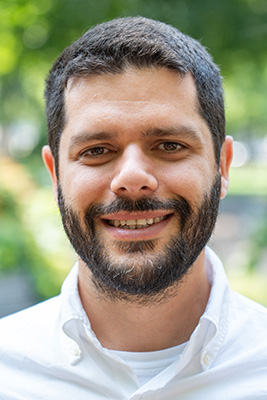Faculty Profile
Diego Vega
Assistant Professor of Political Science (2024)Contact Information
Denny Hall
717-254-8953
http://sites.google.com/view/vegadiego
Bio
Diego Vega is a Comparative Politics specialist with a regional focus in Latin America. His research includes presidential politics, public policy and policymaking, electoral administration, and the effects of populism on democracy. Dr. Vega's work has been published in Democratization and Latin American Politics and Society. He is working on a book about the role of presidents in international policy diffusion. Dr. Vega is Argentinian-Brazilian and has conducted fieldwork research in Argentina and Colombia. Dr. Vega is also a Chevening scholar. Before entering academia, he worked as a journalist in Brazil and participated in the Panama Papers investigation, which received a Pulitzer Prize in 2017.
Education
- B.A., Faculdade Cásper Líbero, 2007
- B.A., Universidade de São Paulo, 2010
- M.Sc., London School of Economics, 2015
- Ph.D., University of Texas at Austin, 2024
2025-2026 Academic Year
Fall 2025
POSC 150 Comparative Politics
An introduction to comparative political analysis with applications to political systems, processes, and issues worldwide. The purpose of the course is to learn to observe political life systematically, analyze a wide range of political phenomena, and distinguish and evaluate the assumptions underlying alternative approaches to the study of politics. The course may address topics such as democratization, authoritarian challenges to democratic systems, social inequality and underdevelopment, sustainability, political corruption, human rights, and political violence.
LALC 200 Contemp Brazilian Politics
Cross-listed with POSC 290-03 and PORT 380-02. This course analyzes the construction and transformation of Brazil's democracy since the end of the military dictatorship in 1985. Part of the semester is an overview of the political and social disputes affecting the country's democratic institutions during this period, using political science research associated with local expressions of political thought. The second half of the course addresses specific topics relevant to Brazil, including social and racial inequalities, environmental destruction (with a focus on the Amazon region), the role of sports in politics, and the military's interference in democratic processes.
POSC 290 Contemp Brazilian Politics
Cross-listed with LALC 200-01 and PORT 380-02. This course analyzes the construction and transformation of Brazil's democracy since the end of the military dictatorship in 1985. Part of the semester is an overview of the political and social disputes affecting the country's democratic institutions during this period, using political science research associated with local expressions of political thought. The second half of the course addresses specific topics relevant to Brazil, including social and racial inequalities, environmental destruction (with a focus on the Amazon region), the role of sports in politics, and the military's interference in democratic processes.
PORT 380 Contemp Brazilian Politics
cross-listed with LALC 200-01 and POSC 290-03. This course analyzes the construction and transformation of Brazil's democracy since the end of the military dictatorship in 1985. Part of the semester is an overview of the political and social disputes affecting the country's democratic institutions during this period, using political science research associated with local expressions of political thought. The second half of the course addresses specific topics relevant to Brazil, including social and racial inequalities, environmental destruction (with a focus on the Amazon region), the role of sports in politics, and the military's interference in democratic processes.
Spring 2026
LALC 101 Intro Latin American Studies
A multi-disciplinary, introductory course designed to familiarize students with the regions through a study of their history, economics, politics, literature, and culture in transnational and comparative perspective. The purpose of the course is to provide a framework that will prepare students for more specialized courses in particular disciplines and specific areas of LALC studies.
Required of all LALC majors.
LALC 251 Latin Amer Govt & Politics
Cross-listed with POSC 251-01.
POSC 251 Latin Amer Govt & Politics
Cross-listed with LALC 251-01.
POSC 265 Public Policy and Policymaking
Cross-listed with LAWP 290-02.
LAWP 290 Public Policy and Policymaking
Cross-listed with POSC 265-01. This course examines the politics around public policies and policymaking in the United States and abroad. The semester starts by exploring how political forces and ideas operate in the creation of new policies, using political science theories as tools to understand policymaking processes. After that, the course explores multiple issue areas (e.g., educational policy, social policy, economic policy, environmental policy, etc.), analyzing policies implemented in countries like Bangladesh, Brazil, South Africa, Germany, the United Kingdom, and the United States. This comparative perspective will be central to evaluating policy designs and outcomes, with a focus on the differences between the Global North and Global South.
